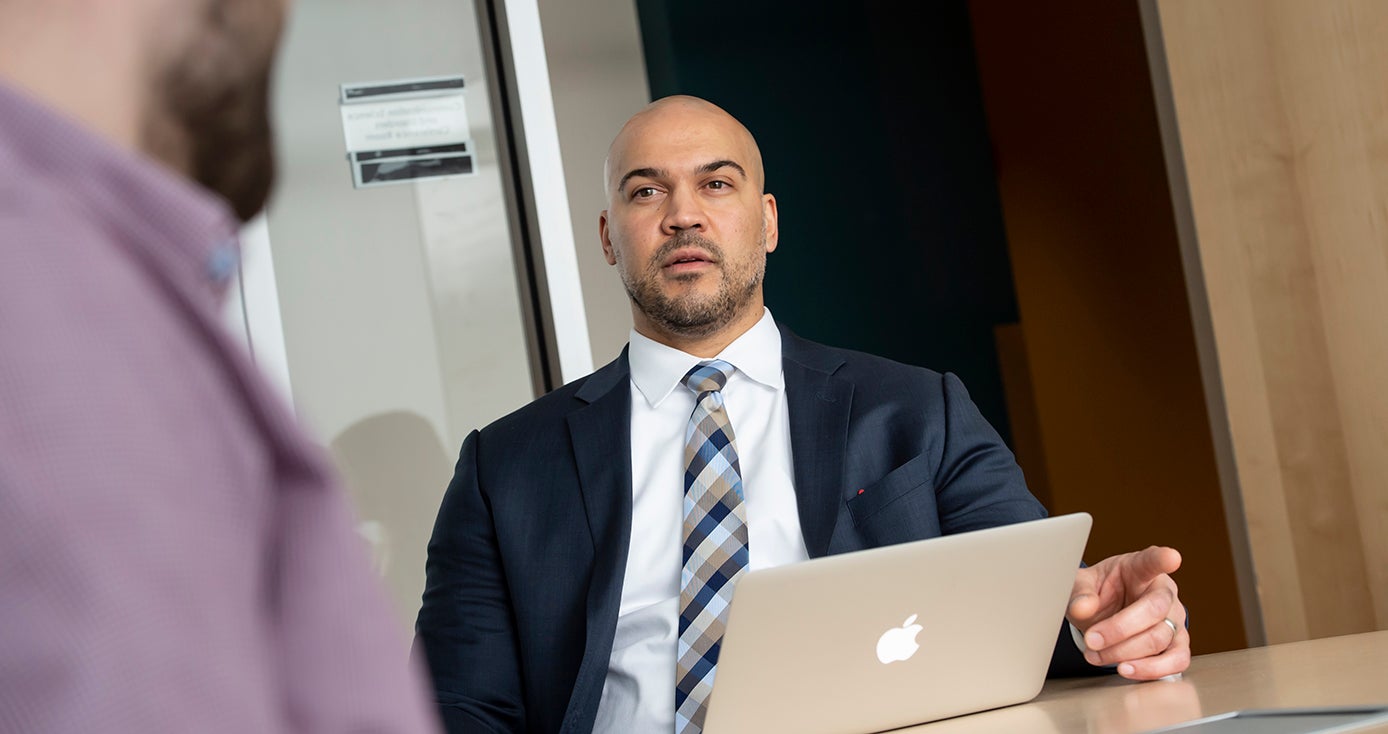
Subscribe to Pittwire Today
Get the most interesting and important stories from the University of Pittsburgh.Students Receive Impactful Mentorship Through New Program
Like many other health care fields, audiology and speech-language pathology are not particularly diverse. About 18% of audiology students identify as non-white, according to a 2020 survey; meanwhile, about 8% of speech-language pathologists identify as non-white, according to 2019 data from ASHAWire, part of the American Speech-Language-Hearing Association.
A program founded in the fall of 2020 between the University of Pittsburgh, Case Western Reserve University and Hampton University seeks to change those statistics.
The Innovative Mentoring and Professional Advancement Through Cultural Training (IMPACT) program supports diverse students’ acceptance into top graduate programs for speech-language pathology and audiology, and seeks to mold future leaders who understand and embody inclusion, diversity and compassion.
When Victoria Joseph was first introduced to IMPACT, she applied without hesitation.
“A mentoring program for students from two universities and ideally from different parts of the country who can relate by being women, from communities of color, and interested in advocating for diversity in a profession where diversity is lacking is something I had to be a part of,” said Joseph, a senior student in Hampton’s communicative sciences and disorders program. “Mentorship is something that I always thought was necessary when transitioning into different chapters of life.”
Joseph is one of 10 students in the first cohort of the IMPACT program. The students have been participating in a cultural empathy book club, undergoing training for research participation and attending virtual activities, such as tours of the communication science disorders program at Pitt and Boys Town National Research Hospital in Omaha, Nebraska.
They will also submit a proposal for a poster presentation for the 2021 American Speech–Language-Hearing Association Convention, contribute to an IMPACT Instagram account and prepare graduate school application essays.
Six of the 12 virtual activities include “family dinners,” where communication science disorders professionals join the students for dinner. Dinner has been delivered to every participant’s home while meetings have been held virtually.
“Hearing the remarks of so many prominent figures in this field, many of which had their intellect judged or experienced microaggressions in their place of work, definitely opened my eyes and made me want to strive harder and be an advocate for people of color in this profession,” said Joseph.
A goal bigger than Pitt
Jessica Sullivan from Hampton and Lauren Calandruccio from Case Western Reserve came together and address problem of representation in their field.
“During ASHA 2019, we began discussing how difficult it was for students of to make in to graduate programs and how strong mentorship at the undergraduate level and the right graduate program could make a difference,” said Sullivan.
The duo reached out to Bernard Rousseau, professor and chair of communication science and disorders (CSD) at Pitt’s School of Health and Rehabilitation Sciences, to help implement the program. They said they were aware of the strength, reputation and strong history of the CSD program at Pitt.
“We thought we would have many allies on the faculty at Pitt that would support and embrace our program. We were met with such enthusiasm; we knew Pitt would be the perfect partner,” said Calandruccio.
Pitt CSD has been providing research training experiences to students in the program. Rousseau said the program aligns with the University’s goal to promote equity, diversity and inclusion.
“Through the IMPACT program, we have identified specific priorities and opportunities for our department to participate in the national conversation by providing research training experiences to students of diverse backgrounds and experiences,” said Rousseau. “We are excited to partner with these universities to advance the preparation of students in audiology and speech-language pathology through innovative mentoring, immersive research training and cultural training experiences.”
While students who graduate from the IMPACT program may not necessarily pursue graduate studies at Pitt, Hampton or Case Western Reserve, program leaders say the bigger hope is these students will go on to pursue such studies at peer institutions.
“I don’t think any other program like this brings together the constellation of opportunities to connect students with professionals and educators,” said Michael Walsh Dickey, associate professor in the Department of Communication Science and Disorders at Pitt and director of the department’s PhD program. “We’re hopeful they consider us, but more importantly, we want them to be prepared when they matriculate into graduate programs.”
Joseph said the program has taught her to be proud of every accomplishment, especially the small ones.
“Most of my undergraduate career consisted of me not giving myself enough credit or thinking that I wasn’t ‘doing enough’ when in reality, I wouldn’t be as far as I am if I weren’t ‘doing enough.’ I will be able to excel in my career knowing that all accomplishments should be appreciated and I have the IMPACT program to thank for that,” she said.
Another student who has called the mentorship offered through the program “invaluable” is Vivian Ma, a junior communication sciences and psychology major at Case Western Reserve.
“It's an amazing opportunity for underrepresented undergraduate speech-language pathology or audiology students, as there is a lack of racial and ethnic minority students and workers in the field despite the diversity in the populations that we must serve,” she said. “Additionally, our group has improved our ability to deal with difficult race-based conversations and been working on a proposal for ASHA members to promote greater diversity.”


